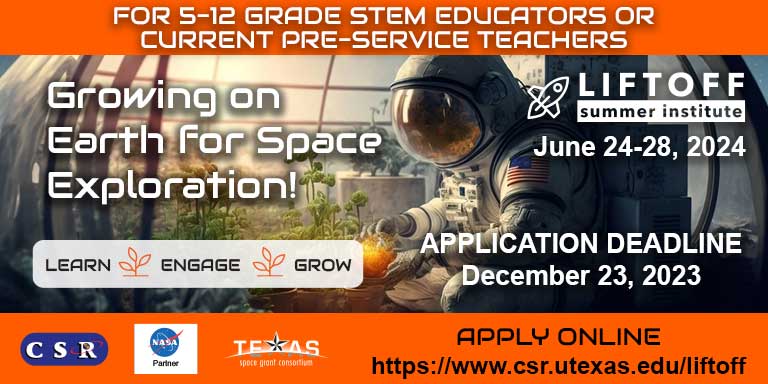Due to federal mandates, vaccinations and masks may be required for those attending in person. We will update as more details become available.
PROGRAM ANNOUNCEMENT
Beginning in the summer of 1990, NASA’s Texas Space Grant Consortium initiated a weeklong professional development training for teachers. This aerospace workshop, called LiftOff, emphasizes science, technology, engineering, and mathematics (STEM) learning experiences by incorporating a space science theme supported by NASA missions. Teacher participants are provided with information and experiences through speakers, hands-on activities and field investigations that promote space science and enrichment activities for themselves and others.
PROGRAM HIGHLIGHTS
Plants will play a critical role in the survival of human beings on long-duration space missions. Plants can adapt to extreme environments on Earth and studied plant species have shown to grow and develop through a full life cycle in microgravity. Long-term human space exploration missions require a life support system in which vascular plants play a vital role.
Growing plants in space is not only about developing our technological capacity to provide plants with adequate growth conditions in the unique microgravity environment, but it is also about the relationship between plants and space explorers. Decades of research have shown that there are many limitations to growing plants in microgravity and on other planets.
As human space exploration advances so should our knowledge and expertise to grow plants on long-duration space missions, on the Moon, and on other planets. Participants will increase their understanding of specialized environments for growth and development on Earth, in microgravity, and beyond!
Join us for LiftOff 2024 to increase your knowledge about Growing on Earth for Space Exploration!
PROGRAM FEATURES:
- Presentations by NASA scientists and engineers
- Hands-on, inquiry based classroom activities aligned to educational standards
- Career Exploration
- Teacher Feature (sharing of classroom lessons and activities)
- Opportunity to interact with researchers dedicated to space missions
ELIGIBILITY REQUIREMENTS
- Currently employed as a 5-12 grade STEM educator or current pre-service teacher
- Demonstrate willingness to share information with others
- Must be a U.S. citizen
REGISTRATION INFORMATION
- Texas Participants: Hotel, meals, tours, and local travel provided. Up to $250 stipend provided to Texas teachers for travel, depending on distance to JSC.
- Out-of-State: $1,250 registration fee (includes lodging, meals, tours)
- Participants or sponsoring Space Grants will be responsible for travel to Houston, Texas
- Applications: Must be submitted online
Funded by Texas Space Grant Consortium (TSGC grant number 80NSSC20M0036). Program announcement is contingent upon receiving NASA funding.

